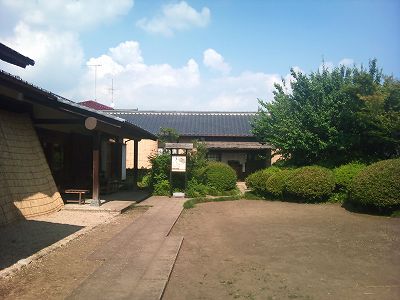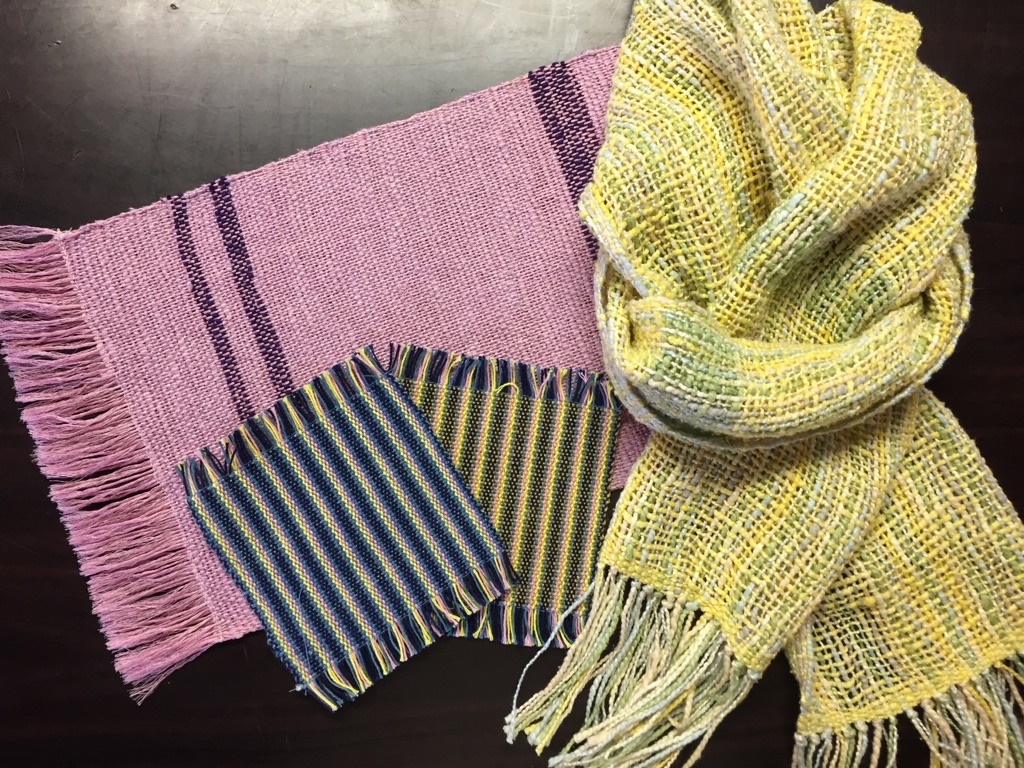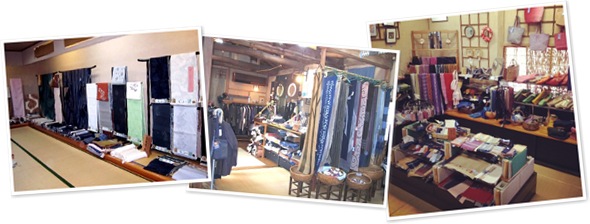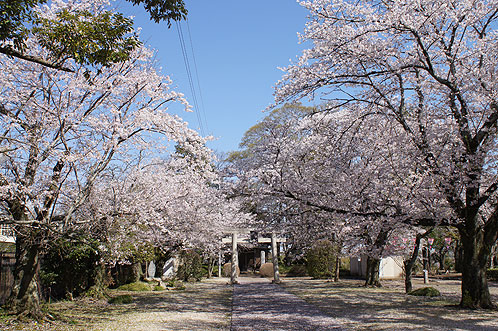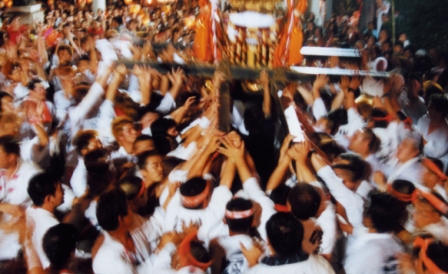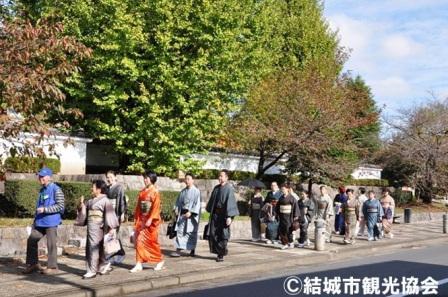
HOME >> ENGLISH PAGE
ABOUT TSUMUGI-NO-SATO
Pastoral gardens and rustic architecture conjure an idyllic air of tranquility and tradition in which to experience Japanese weaving and indigo-dyeing at Tsumugi-no-Sato.
Nestled amid nature in Yuki City (Ibaraki Prefecture), Tsumugi-no-Sato lies off the beaten path, yet well within day-trip distance of Tokyo. Friendly English-speaking staff is on hand to assist you t hroughout.
Weaving
Weave coasters(¥1,500+tax), centerpieces(¥3,500+tax), shawls(¥7,000~), and more from your choice of over forty fabric colors. The looms are powered by your feet, hands, and imagination (not electricity), and our staff will gladly provide you all the guidance you need to craft your unique creation.
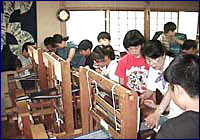
Indigo-dyeing
Render your own personal design onto handkerchiefs(¥1,000+tax), bandanas(¥1,500+tax), eco-bags(¥1,500+tax) and dye them any shade from deep navy blue to bright sky. Aprons and gloves provided at no additional charge.
Indigo is said to naturally repel insects and ward off germs. All of Tsumugi-no-Sato's indigo comes from plants grown and cultivated in Japan.
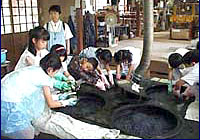
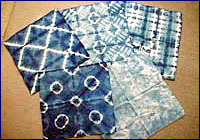
We exhibit Yuki-tsumugi and sell original items.
*I am sorry to inform you but we do not accept payment by credit card.
We only accept payment by cash only.
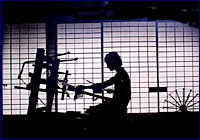
Contact Information
Tsumugi-no-Sato
2515 Yuki, Yuki City, Ibaraki 307-0001
TEL: 0296-32-8002 FAX: 0296-33-4125
URL: http://www.tsumugi.co.jp/
e-mail: info@tsumugi.co.jp
You can also contact from facebook.
Business Hours
Open 10:00 AM - 4:30 PM everyday
Closed National holidays and the first Sunday of each month.
Closed during New Year's break (Dec. 27 - Jan. 6) and during Summer Holiday O-Bon (Aug. 13-17)
YUKI TSUMUGI
Yuki tsumugi is a high-grade silk textile fashioned in a folk art style via techniques handed down from the Nara period (8th century). All the work is done by hand, from the spinning to the actual weaving. The process yields silk with a unique texture and the highest possible quality.
Spinning
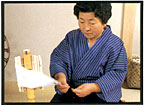
Floss silk, or mawata, is wrapped around a tool known as a tsukushi. As it is spun by hand, the thread is led into a special tub called an oboke.
The spinner must produce thread of a uniform thickness based on whether it will be used as warp or woof (horizontally or vertically) and the type of cloth to be made. Yuki tsumugi is the only fabric in the world not reinforced by twisting.
Kasuri-kukuri (pattern tying)
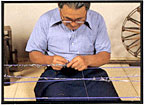
Threads are tied by cotton yarn to prevent permeation during the dyeing process and to create patterns on the fabric. There are four classes of tying, depending on the number of hexagonal patterns to be included in the width of the cloth.
Weaving
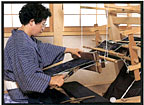
Yuki tsumugi is woven using a loom known as a jibata, which has been used in its present form for over 1500 years.
Weaving garments is meticulous and time-consuming work. A strap around the weaver's waist adjusts the tension of the vertical thread on the loom to make the tsumugi soft and elastic. After the horizontal thread is woven in by a yarn guide, an oaken shuttle presses the thread lengthwise, giving Yuki Tsumugi its durability, lightness, and warmth.
About Yuki City
While Yuki is known mostly for its tsumugi fabrics and products, excellent local sake purveyors Buyuu, Fukufuku, and Tsumugi Bijin are also worthy of renown. There are also several seasonal attractions to enjoy.
 |
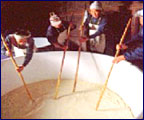 |
 |
| Tsumugi fabrics and products |
Refined sake | Paulownia wood chest |
Spring
More than 250 cherry trees bloom in Jōshi Park, a former castle site, during Yuki's Cherry Blossom Festival.
Summer
Visitors flock to watch locals parade shrines through the streets in the annual Summer Festivals of the Takeda-Suga shrine.
Autumn
The city turns its energy and attention to the Noppe Festival and the Tsumugi Festival.
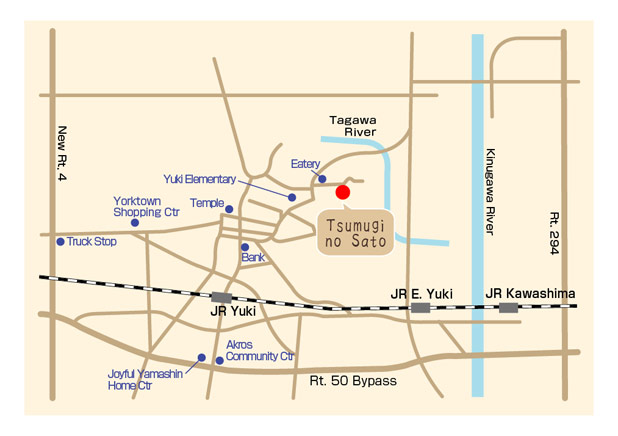
Access to YUKI
By Train from Tokyo/Ueno
Take the Utsunomiya Line from JR Ueno to JR Oyama station (75 min.). From Oyama, transfer to the Mito Line and ride to Yuki station (7 min.). Tsumugi-no-Sato is 20 min. on foot from Yuki station (see map above. Bicycle rental and taxi also available).
Shinkansen: JR Tokyo to JR Oyama station (45 min.). Follow directions above from Oyama.
By Train from Mito
Board the Mito line bound for Oyama and ride to Yuki (70 min.). Tsumugi-no-Sato is 20 min. on foot from Yuki station (see map above. Bicycle rental and taxi also available).
By Car
Tohoku Expressway: Exit at the Sano-Fujioka IC and take Route 50 east about 25 km to reach Yuki.
Joban Expressway: Exit at the Yawara IC and take Route 294 north about 44 km to reach Yuki.
From Mito: Take Route 50 west about 60 km to reach Yuki.
More Information
-Yuki City Commerce and Tourism Division TEL: 0296-32-1111
-Ibaraki Prefecture Tourism and Local Products Division TEL: 029-301-3617
-Ibaraki Prefecture Website URL: http://www.pref.ibaraki.jp/
-Yuki City Website URL: http://www.city.yuki.ibaraki.jp/
